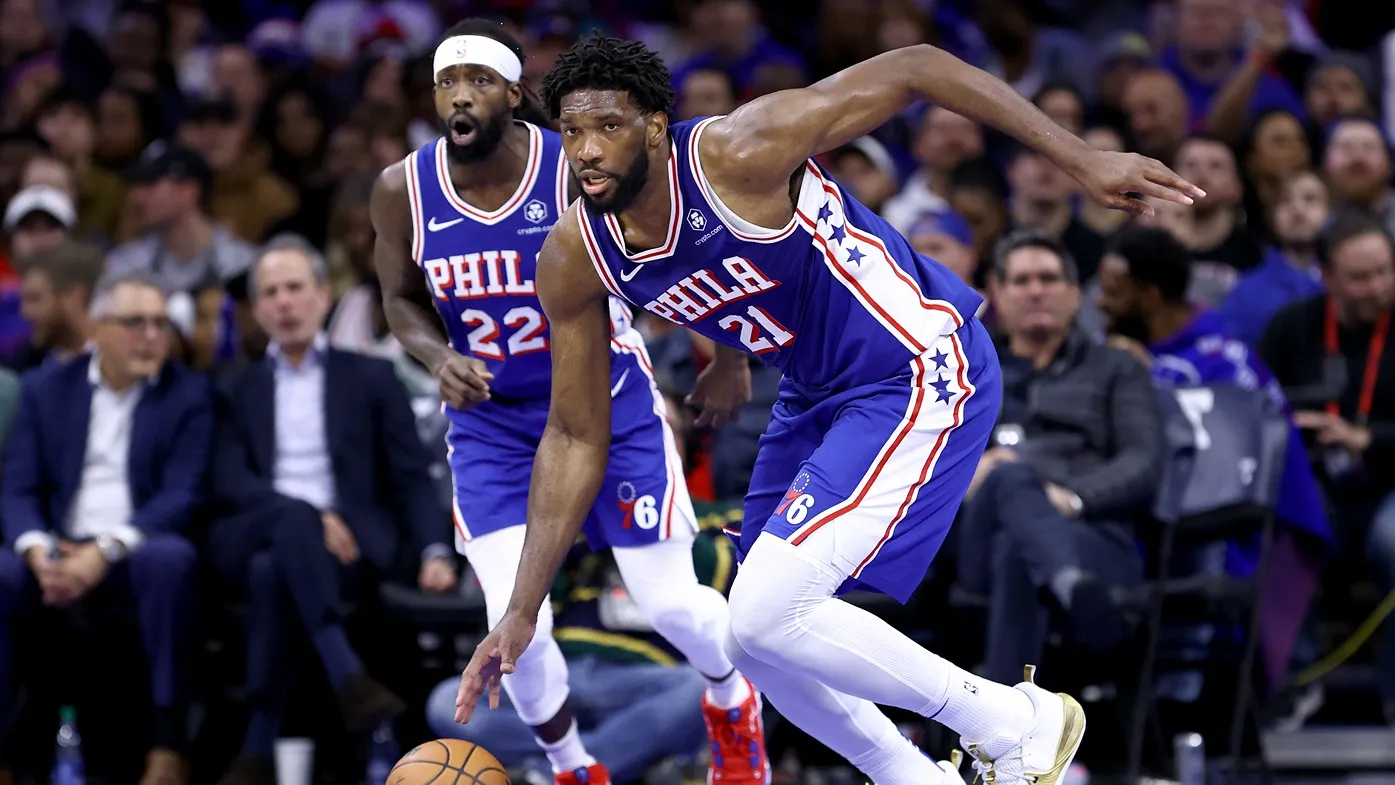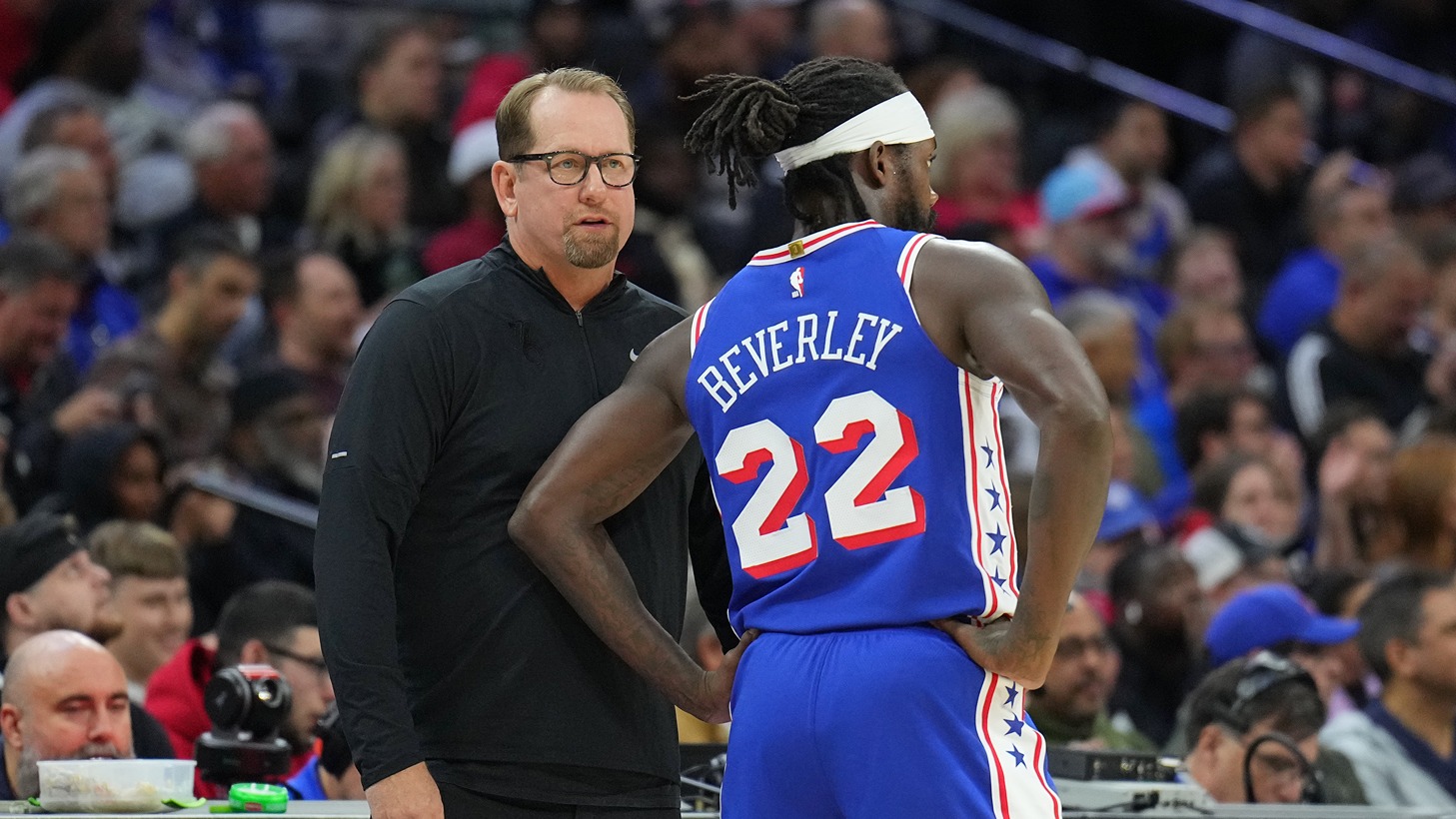Which Sixers team is the greatest ever?
There’s no definitive, indisputable way to answer that question. Simulations are one interesting avenue to explore it, though.
Strat-O-Matic ran through a mini-tournament for NBC Sports Philadelphia, simulating two semifinals and a Finals series. The seeds were:
Stay in the game with the latest updates on your beloved Philadelphia sports teams! Sign up here for our All Access Daily newsletter.
1. 1966-67 Sixers
2. 1982-83
3. 2000-01
4. 2018-19
Naturally, the ’18-19 squad’s roster is what the Sixers had heading into the playoffs following their trades for Tobias Harris and Jimmy Butler. That team lost to the Raptors (and current Sixers head coach Nick Nurse) in a Game 7 featuring Kawhi Leonard, strange physics and devastation.
Philadelphia 76ers
Allen Iverson and a gritty supporting cast won the Eastern Conference title in 2000-01.
As the only two Sixers teams to earn an NBA championship, the ’66-67 and ’82-83 teams are clear choices for the tournament. Led by MVP big men Wilt Chamberlain and Moses Malone, those squads won 68 and 65 regular-season games, respectively.
Let's look at the first semifinal series and some numbers that jumped out from the Strat-O-Matic box scores:
Game 1: ’66-67 team wins, 115-107 (1-0 series lead)
Both teams got well-balanced scoring in the series opener. Six players on each side reached double figures.
For the ’66-67 group, the names are all predictable: Guards Hal Greer and Wali Jones, forwards Chet Walker and Luke Jackson, the legendary Wilt Chamberlain, and second-year standout Billy Cunningham.
For the ’18-19 team, Joel Embiid and Tobias Harris were joint top scorers with 20 points apiece. Head coach Brett Brown used a player even larger than Chamberlain off the bench, giving 7-foot-4 Boban Marjanovic 12 minutes. The always-affable veteran chipped in 10 points on 4-for-4 shooting and seven rebounds.
As he regularly did, Chamberlain played the full 48 minutes and posted a dominant triple-double — 22 points, 21 rebounds and 11 assists.
However, Chamberlain’s free throw shooting weakness was especially pronounced. A 51.1 percent career foul shooter, Chamberlain went 0 for 8 in Game 1. During the real-world ’66-67 Finals, he was 22 for 72 (30.6 percent).
Game 2: ’66-67 team wins, 103-94 (2-0 series lead)
Tough outing for Embiid, who shot just 5 for 24 for the field.
Meanwhile, Chamberlain kept on commanding all aspects of the game. This triple-double was a 20-point, 20-rebound, 13-assist performance. He blocked seven shots, too.
We imagine the age and experience gap had a major role in the center matchup. Chamberlain was 30 years old during the ’66-67 playoffs, while Embiiid was 25 during the ’18-19 postseason. The 2023-24 version of Embiid tends to look more Chamberlain-esque, routinely recording 40-point games and making an enormous all-around impact.
Greer, who’s still the Sixers’ all-time high scorer, led everyone in Game 2 with 26 points.
Game 3: ’66-67 teams wins, 107-92 (3-0 series lead)
No triple-double this time for Chamberlain … but 28 points on 14-for-16 shooting, 25 rebounds, seven blocks, six assists and three steals is sure not a shabby night.
Again, he managed all that production despite abysmal foul shooting — 0 for 9 in Game 3. Frequent strategic hacking absolutely would’ve been warranted.
The ’66-67 team took a 3-0 series advantage despite an 0-for-7 evening from long range. Threes obviously did not exist in the NBA during the ‘60s, so players like Greer and Walker were accustomed to doing lots of mid-range damage.
Perplexingly, the ’66-67 unit still had the better three-point percentage in the series. The ’18-19 squad went an appalling 18 for 94 (19.1 percent) on long-range jumpers. The ’66-67 team shot 9 for 37 (24.3 percent).
A Game 3 head-scratcher: Greg Monroe somehow shot 2 for 10 from the field with six offensive rebounds in just 10 minutes.
Game 4: ’66-67 team wins, 125-113 (4-0 series victory)
How about a quadruple-double?
Chamberlain sealed the series by notching 24 points, 23 rebounds, 11 assists and 11 blocks.
Greer added 33 points and Walker tallied 23. Embiid, Ben Simmons and Butler all scored over 20 in the series finale.
Ultimately, the ’18-19 Sixers were left to rue their many missed jumpers and the fact that no one in the world could stop peak Chamberlain from doing it all.
The Finals are up next for Hall of Fame head coach Alex Hannum’s ’66-67 squad. We’ll dive into the second semifinal — ’82-83 vs. ’00-01 — in our next installment.


